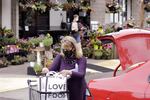
A woman wearing a face mask loads groceries into her car after shopping at a Zupan's grocery store in Portland, Ore., on Friday, May 21, 2021.
Gillian Flaccus / AP
The delta variant of the coronavirus is spreading in Oregon, albeit slowly, while other states and countries are requiring or recommending facemasks to curb its spread.
The World Health Organization says that vaccinated people should wear masks; the U.S. Centers for Disease Control and Prevention does not. Kim Repp, the chief epidemiologist for Washington County, Oregon, stopped short of saying vaccinated people should wear masks to avoid the delta variant. But she did say during an appearance on OPB’s “Think Out Loud” on Wednesday that masking indoors can still help protect vaccinated people from getting COVID-19.
“Masks are best practice,” Repp said. “That’s not really something profound.”
The delta variant of the coronavirus was first identified in India, where the very transmissible variant led to a dramatic increase in deaths from COVID-19. As the variant has arrived in other countries with different vaccination rates, it has led to an increase in infections. In many U.S. states, it has become the dominant variant. In Los Angeles. County, where about 51% of the residents are vaccinated, the arrival of the delta variant led to a sharp rise in cases and hospitalizations. The health department has asked vaccinated individuals to mask up.
Oregon hasn’t done that yet. While state officials acknowledge that masks can confer protection, they have stopped short of recommending it, instead emphasizing the individual choice of all Oregonians to protect each other. And although the delta variant is becoming more common in Oregon, it hasn’t yet taken off. And many pockets of Oregon have low vaccination rates.
“The delta variant will get into one of those communities and spread like wildfire through all of the people who aren’t vaccinated,” Repp said. “And then once it bumps up against people who are vaccinated, it shifts and then looks for the next group of people.”
During a delta-variant outbreak in Israel, where about 57% of the population is fully vaccinated, a study found that the Pfizer-BioNTech vaccine was 64% effective at preventing illness from COVID-19.
That’s a big dip from the pre-delta studies that said the Pfizer vaccine was 95% effective. Other studies found much higher efficacy rates for both mRNA vaccines against delta. But there are two things all studies agree on: The vaccines are very effective at preventing serious illness from all COVID-19 variants, and the delta variant seems at least a bit better at getting around vaccines than other variants.
That’s one reason the World Health Organization has continued to recommend masks for vaccinated individuals.
Another reason the CDC has cited, and which Repp echoed, is that other countries have lower vaccination rates than the U.S. By that logic, the U.S. should issue different advice than an organization issuing blanket recommendations for all countries.
But countries with high vaccination rates, like Israel, struggled in the face of the delta variant and ended up requiring masks for all individuals.
There is also the issue of transmission in vaccinated individuals: early evidence shows that vaccinated people can transmit the delta variant.
Contact “Think Out Loud®”
If you’d like to comment on any of the topics in this show, or suggest a topic of your own, please get in touch with us on Facebook or Twitter, send an email to thinkoutloud@opb.org, or you can leave a voicemail for us at 503-293-1983. The call-in phone number during the noon hour is 888-665-5865.